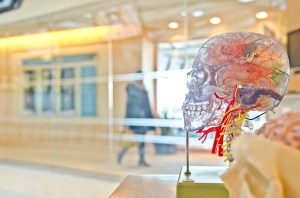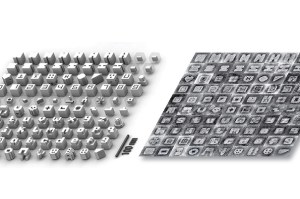Tag: Donald Ingber
-
Science & Tech
DNA, assemble
A concept for seeded all-or-nothing assembly of micron-scale DNA nanostructures that could extend nanofabrication capabilities and enable creation of highly specific diagnostics.
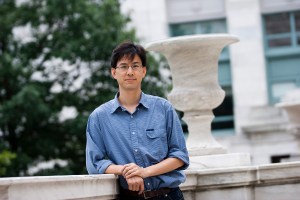
-
Science & Tech
Better vaccines are in our blood
New platform technology uses red blood cells to generate targeted immune responses in mice
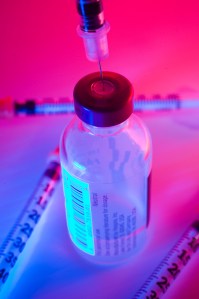
-
Campus & Community
Wyss donates third major gift
The Wyss Institute for Biologically Inspired Engineering at Harvard University announced today the latest gift of $131 million from its founder, entrepreneur and philanthropist Hansjörg Wyss, M.B.A. ’65.
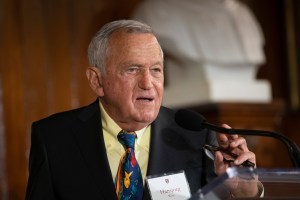
-
Science & Tech
A step closer to tissue-engineered kidneys
The Wyss Institute and Roche Innovation Center Basel in Switzerland have teamed up to create 3-D bioprinted proximal tubules beside functioning blood vessel compartments, closely mimicking the kidney’s blood-filtration system that removes waste products while returning “good” molecules, such as glucose and amino acids, back into the bloodstream.
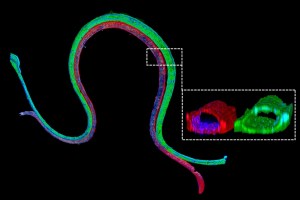
-
Health
Harnessing nature to beat cancer
Every year, more than 18 million people around the world are told, “You have cancer.” In the U.S., nearly half of all men and more than one-third of women will…
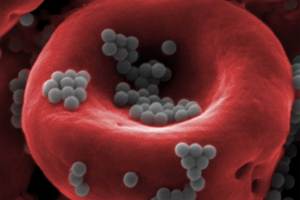
-
Health
Creating a smoking machine
Researchers at Harvard’s Wyss Institute have developed an instrument that smokes cigarettes like a human, and delivers whole smoke to the air space of microfluidic human airway chips. The machine may enable new insights into how nonsmokers and COPD patients respond to smoke.
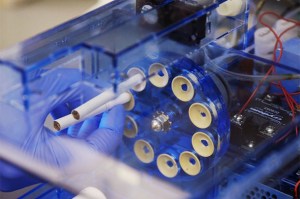
-
Science & Tech
Creating 3-D tissue and its potential for regeneration
“This latest work extends the capabilities of our multi-material bioprinting platform to thick human tissues, bringing us one step closer to creating architectures for tissue repair and regeneration,” says the study’s senior author, Jennifer A. Lewis of both the Wyss Institute and Harvard’s Paulson School for Engineering and Applied Sciences.
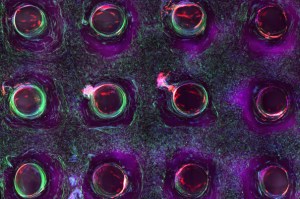
-
Health
Blood clot breakthrough uses drug-device combo
Harvard-affiliated researchers are working on a procedure that will allow fully obstructed blood clots in the brain to be cleared using a device that opens a small channel through the blockage, which combines with a clot-busting drug to target the obstructed site.
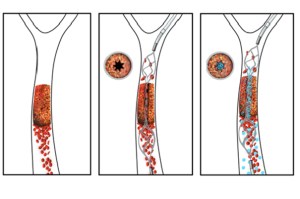
-
Science & Tech
Wyss improves sepsis device
Scientists at the Wyss Institute have improved a device developed last year to treat sepsis that works by mimicking the human spleen. The new device is better positioned for near-term use in clinics.
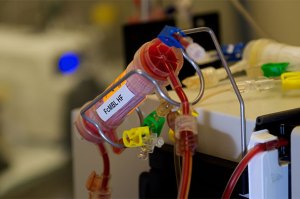
-
Health
Bacteria ‘factories’ churn out valuable chemicals
A team of researchers led by Harvard geneticist George Church at the Wyss Institute for Biologically Inspired Engineering and Harvard Medical School has made big strides toward a future in which the predominant chemical factories of the world are colonies of genetically engineered bacteria.
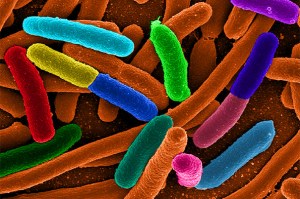
-
Science & Tech
Wyss Institute’s organs-on-chips develops into new company
The Wyss Institute for Biologically Inspired Engineering at Harvard University announced on Monday that its human organs-on-chips technology will be commercialized by a newly formed private company to accelerate the development of pharmaceutical, chemical, cosmetic, and personalized medicine products.
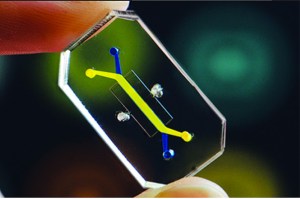
-
Health
Measuring life’s tugs and nudges
Harvard scientists have devised the first method to measure the push and pull of cells as embryonic tissue develops. The cells’ tiny forces are measured in 3-D tissues and living embryos.
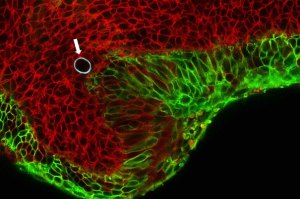
-
Health
Cancer vaccine begins Phase I clinical trials
A cross-disciplinary team of Harvard scientists, engineers, and clinicians announced Sept. 6 that they have begun a Phase I clinical trial of an implantable vaccine to treat melanoma, the most lethal form of skin cancer.

-
Campus & Community
A year of change, month by month
2012-13 was a year of inventions and ascensions, elections and projections, digitizing and prioritizing. The University also launched HarvardX, the wildly popular web learning platform.

-
Campus & Community
Lung-on-a-Chip wins prize
Wyss Institute Founding Director Donald Ingber received the NC3Rs 3Rs Prize from the U.K.’s National Centre for the Replacement, Refinement, and Reduction of Animals in Research for his innovative Lung-on-a-Chip.
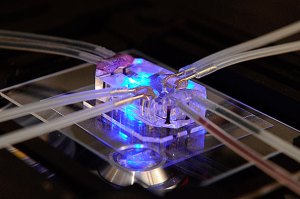
-
Health
New way to model human disease
Researchers at the Wyss Institute for Biologically Inspired Engineering at Harvard University have mimicked pulmonary edema in a microchip lined by living human cells. They used this “lung-on-a-chip” to study drug toxicity and identify potential new therapies to prevent this life-threatening condition.
-
Science & Tech
Smart suit improves physical endurance
Harvard’s Wyss Institute for Biologically Inspired Engineering announced that it has received a $2.6 million contract from the Defense Advanced Research Projects Agency (DARPA) to develop a smart suit that helps improve physical endurance for soldiers in the field.
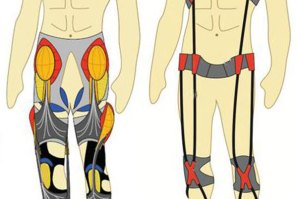
-
Health
Clot-busting technology goes straight to work
Researchers at the Wyss Institute for Biologically Inspired Engineering at Harvard have developed a novel biomimetic strategy that delivers life-saving nanotherapeutics directly to obstructed blood vessels, dissolving blood clots before they cause serious damage or even death.
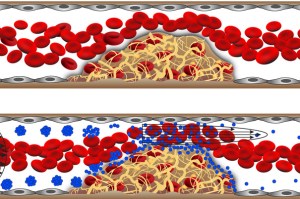
-
Science & Tech
Using nature to inspire robotics
The annual symposium of the Wyss Institute for Biologically Inspired Engineering, held at Harvard Medical School, prompted a spirited discussion on robotics and medicine, with nature as a model.
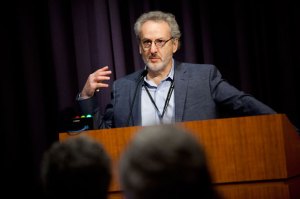
-
Health
Sending DNA robot to do the job
Researchers at the Wyss Institute for Biologically Inspired Engineering at Harvard University have developed a robotic device made from DNA that could potentially seek out specific cell targets within a complex mixture of cell types and deliver important molecular instructions, such as telling cancer cells to self-destruct or programming immune responses.
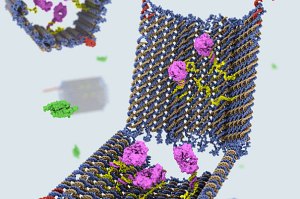
-
Science & Tech
As strong as an insect’s shell
Wyss Institute scientists have created a material that mimics the hard outer skin of bugs. The result is low-cost and easily manufactured, and tough. It eventually might provide a more environmentally friendly alternative to plastic.
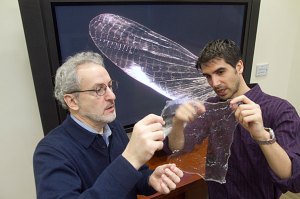
-
Campus & Community
Donald Ingber wins 2011 Holst Medal
Donald Ingber, the Judah Folkman Professor of Vascular Biology at Harvard Medical School and founding director of the Wyss Institute for Biologically Inspired Engineering, has been awarded the 2011 Holst Medal.
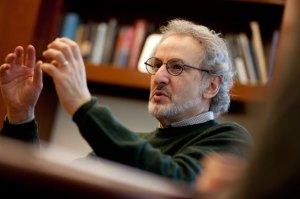
-
Health
Wyss Institute project targets sepsis
The Wyss Institute for Biologically Inspired Engineering at Harvard has been awarded a $12.3 million, four-year grant from the Defense Advanced Research Projects Agency to develop a treatment for sepsis, a commonly fatal bloodstream infection.
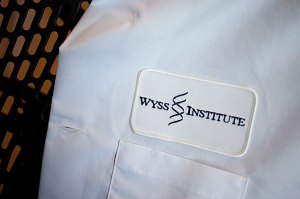
-
Arts & Culture
Bucky on stage
Inventor and futurist R. Buckminster Fuller, thrown out of Harvard College twice in the early 20th century, returns in the center of a one-man play on the “history (and mystery) of the universe.”
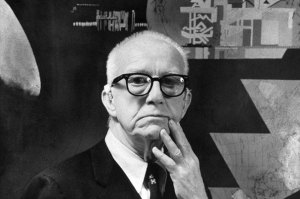
-
Science & Tech
Living, breathing human lung-on-a-chip
Researchers at Harvard’s Wyss Institute for Biologically Inspired Engineering have created a device that mimics a living, breathing human lung on a microchip. The device, about the size of a rubber eraser, acts much like a lung in a human body and is made using human lung and blood vessel cells.



